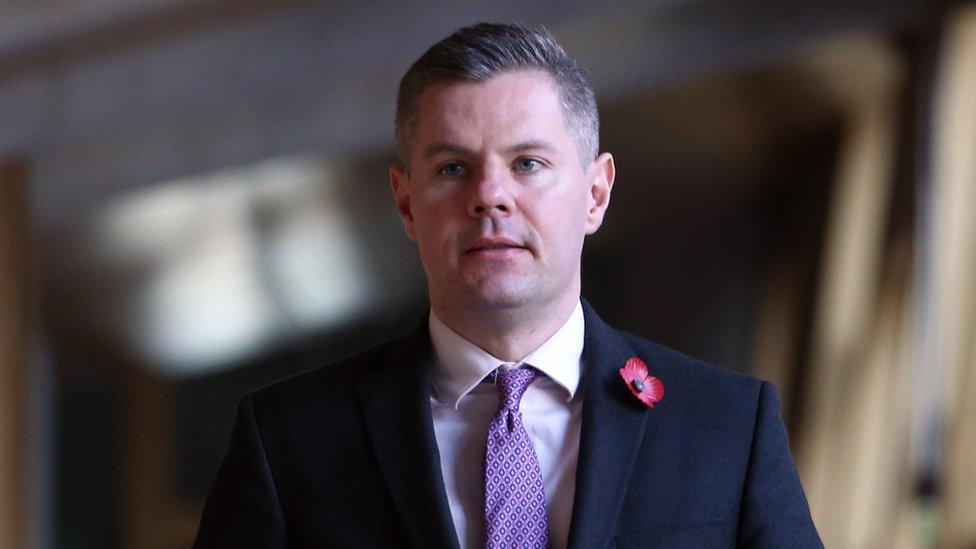First insight into how Scotland's new income tax system is working
- Published

The devolution of income tax powers to Holyrood came with a risk that it might produce lower revenue, so lower spending than sticking with the previous system.
The reverse could also be true - an upside of more tax revenue, so higher spending.
For the first time, we can see how big the difference is. It's the "Jim Bowen number". Remember the 1980s game show Bullseye where Mr Bowen, the host, told competing guests: "It pains me, but I've got to show you what you could have won"?
Well, that's the point Holyrood has now reached: "Let's see what MSPs might have won".
This is rather more than a holiday in Kenya or a Vauxhall Nova. The out-turn figure of £97m that ministers might otherwise have had is manageable, on a budget of more than £30,000 million. But it's politically problematic.
That is the first annual figure showing the gap between the amount raised through the Scottish rate of income tax, and the amount that would have been in Holyrood's budget under the previous Treasury funding formula.
It covers 2017-18. The delay is because it takes more than two years to reconcile all the figures and adjust for the gaps between forecasts of tax revenue and actual outcomes.
And that's been the subject of a new, detailed report by Holyrood's finance committee, external.
Published on Tuesday, much of it is concerned with a very complex new set of problems that is thrown up by those gaps between forecast and outturn.
Next financial year will see more than £100m taken from the Holyrood budget because the forecasts of the Office for Budget Responsibility and the Scottish Fiscal Commission were quite a long way out.

Income tax powers have been partly devolved to Holyrood
The following year is likely to see a far bigger reconciliation - effectively a repayment for 2018-19 of more than £600m. Over the next three years, it adds up to more than a billion pounds taken out of Holyrood spending, much of that because the forecasts were over-optimistic.
That's not the fault of ministers in Holyrood or Westminster. But it is one of the two big categories of financial risk facing Scotland's finance secretary Derek Mackay since most of income tax was devolved. It was enacted after the 2014 independence referendum and the subsequent Smith Commission recommended further devolved powers.
The effect could be more money coming to Holyrood, if the forecasts undershot. But that's not the way it has been so far.
Wage growth
Likewise, it could be that stronger economic growth in Scotland than the rest of the UK, or at least strengthening wages and an income tax base expanding at a faster rate than the UK would leave Holyrood with more money to spend.
That's the incentive for the Scottish government to boost the rate of economic growth.
But that is not what has been happening. So it illustrates the second big category of risk. Growth has been sluggish, and more so than the UK as a whole. Wage growth kept pace with the UK in the years running up to the financial crash, but since then, it has lagged.
And because of that, the amount raised in income tax has fallen behind the distribution that would have come from the Treasury in London.
"The 2017/18 budget is now £97m lower than if income tax had not been partly devolved," says the report.

Derek Mackay is Scotland's finance secretary
The cross-party committee report makes it clear that it is not persuaded Mr Mackay is sufficiently alert to the significant of these reconciliations, and the problems they are going to create from now on.
There are two other responses, cutting along party lines. Critics of the Scottish government can point out that the persistent and prominent arguing for Holyrood to have more powers has succeeded, yet led to less money being available for public services.
Any cut or budget squeeze - on health, care, schools, policing - can now be pinned on this shortfall by opposition MSPs. It is an argument that can be extended to the independence debate: "You want all tax powers? Well, look what's happened with a few of them."
The alternative response, and one you could expect from the Scottish government, is that the devolved income tax powers don't go far enough: it is only with the full set of spanners that the economic motor can be adjusted to reach a faster rate of growth than the UK's.
Indeed, that is roughly what is being stated. A spokesman for the Scottish government told me: "The findings of the Finance and Constitution Committee underline that further evolution of the fiscal devolution settlement, and a strengthening of devolved financial powers, may be necessary".
Will this feed into the current election campaign? Probably, though my guess is that other themes will be more significant.
It will surely be a much more important element of the next Holyrood election campaign leading up to May 2021.
- Published12 December 2018

- Published18 July 2019

- Published1 June 2019
